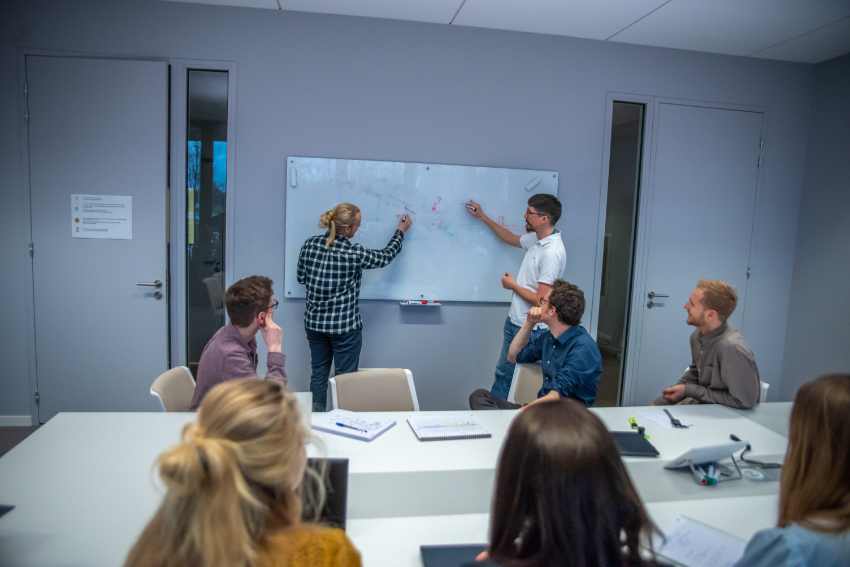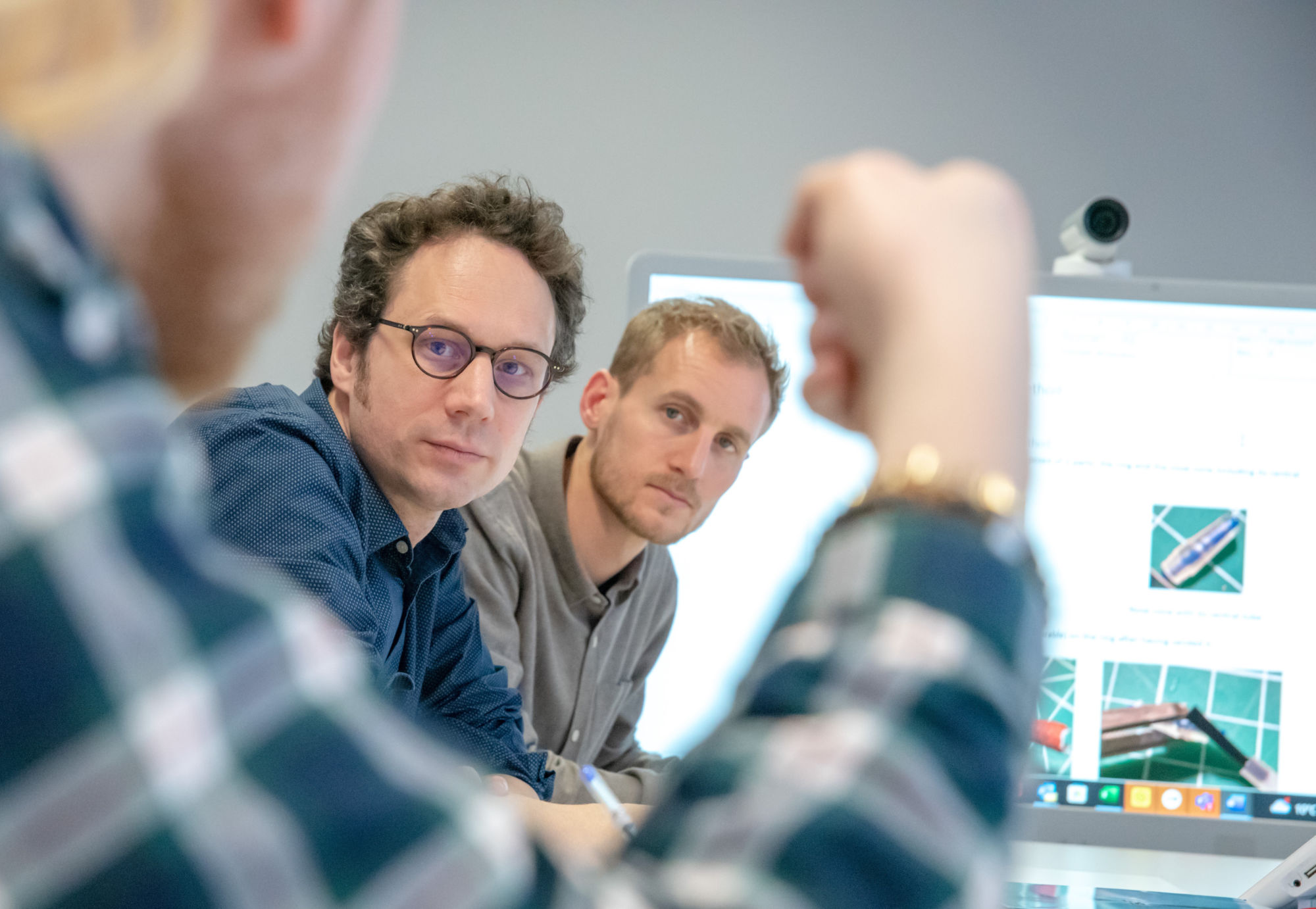Protomed is a French engineering company specialized in the development of innovative medical devices. The company supports medtech companies in turning their ideas into real, functional, and certifiable solutions.
Interview with Frédéric Mouret, CEO of Protomed.
A brief description of the company and its activities.
Frédéric Mouret: We cover all aspects of device development, from concept to industrial transfer, with a particular focus on minimally invasive applications. While delivery systems are one of our specialties, our scope includes any mechanical and material-related challenge in the medical device field.
Our team combines rigorous engineering, shaped by ISO 13485 standards, with a strong creative mindset. We love breaking habits, challenging assumptions, and finding unconventional solutions that work in the real world.
With our in-house prototyping lab, we constantly move from CAD to physical testing. It’s how we validate ideas quickly, refine them through iteration, and design not just for compliance but for real-life performance.
Above all, we are driven by a mission: enabling brilliant minds to bring their vision to life, improve care, and move medicine forward.
What are the main areas of activity of the company?
F.M: Our work covers:
- Mechanical & materials engineering,
- Prototyping & testing in our in-house lab,
- Industrial design & OR-ready ergonomics,
- 5-phase project management,
- Regulatory support (ISO 13485, CE, FDA),
- Manufacturing & industrial partner selection,
- Patent definition and strategic positioning.
Some clients outsource full R&D to us. Others bring us in when their internal teams get stuck. In both cases, we bring clarity, efficiency, and perspective.
We also conduct early-stage POCs to give ideas a fighting chance.
Based in the IHU Strasbourg, we benefit from a world-class ecosystem for preclinical and clinical trials, industrialization, and scaling. One of our clients even embedded an engineer full-time in our office: true partnership in action.
What’s the news about new products/services?
F.M: We’ve just launched ProtoBrix: the first modular toolkit for prototyping minimally invasive delivery systems.
It’s a set of universal components; handles, cones, tubes… designed to simulate real-world conditions. Not for clinical use, but perfect for validating delivery strategy and implant behaviour.
What makes it disruptive? Before ProtoBrix, validating an idea meant custom development, $100K or more, just to get started. Now teams can test concepts in days, not months.
ProtoBrix lets innovators move forward with confidence, before committing to full custom builds.
Sold online via protobrix.fr, components are available individually, in kits, or pre-assembled. A configurator helps define needs. We also offer engineering support from simple advice to full delivery validation.
It’s not just a toolkit, it’s a new way to launch medtech innovation. Smarter. Faster. Safer.
What are the ranges of products/services?
F.M: We offer more than services we provide a roadmap.
We start by defining the real problem, aligning the concept with clinical needs and regulatory demands. Then we design, prototype, test, document, validate, and support industrialization.
We bring fresh eyes to teams facing design deadlocks. We de-risk early concepts through POCs. And we tailor our involvement from full R&D to strategic consulting.
Our strength: adapting to each client’s reality, while keeping a firm grip on regulatory, technical, and clinical coherence.
What is the state of the market where you are currently active?
F.M: The medtech R&D and manufacturing world is in motion, and acceleration is everywhere.
- Equipment is now affordable and accessible.
Thanks to new players like Pilot Line or platforms like Chamfr, startups can have access to great equipment and material off the shelf delivered overnight.
- Knowledge is open.
Design, DFM, materials, regulation you can learn it all online. Barriers are dropping. Iteration cycles are shrinking.
- AI is changing everything.
From design to documentation, AI is becoming a powerful copilot. But here’s the truth: tools don’t replace engineers. They amplify them. Medtech still needs judgment, responsibility, and experience.
The market is also booming, but fragile due to high regulatory costs and pressure on reimbursement.
Startups are everywhere. So is money but it burns fast. It takes years (and millions) to reach patients. New funding models like Singapore’s Medtech Catapult, funding suppliers, not startups, could shift the game.
We’re optimistic but we stay grounded. We use tools wisely. We go faster without cutting corners. Because in medtech, going fast only matters if you get it right.

What can you tell us about market trends?
F.M: There is still a strong concentration of players in medtech R&D and manufacturing. This is largely driven by major industry leaders such as J&J, Medtronic, Boston Scientific, or GE, who increasingly outsource both development and production.
As a result, there’s a growing gap between these large players and startups. When launching a new product, startups often find themselves facing giant contract manufacturers who don’t understand their specific needs or simply decline to engage with projects that are too early-stage or incompatible with high-volume production.
This is where small contract design houses play a critical role in driving innovation. They exist to fill that gap.
To succeed, these smaller firms must be extremely flexible and closely aligned with their clients. They may not be able to cover every region or master every technology, but they can and must build strong international networks. The ability to connect teams across continents and access the right expertise at the right moment is now essential to enabling innovation.
What are the most innovative products/services marketed?
F.M: In medtech, true innovation doesn’t mean “newest gadget.” It means solving real clinical problems within strict regulatory rules.
Yes, robotics, AI-assisted imaging, and connected implants are reshaping healthcare. Sustainability and data privacy are rising fast on the agenda.
But our biggest contribution? Changing how innovation starts.
ProtoBrix empower teams test ideas in days without betting the house on full development. It brings structure, clarity, and momentum when it matters most.
Our consulting packages do the same: bringing strategic, clinical, and technical insight to teams who need more than “execution.”
Innovation isn’t about breaking rules. It’s about giving the right tools, at the right time, to the right people with full awareness of what’s at stake.
What estimations do you have for the second half of 2025?
F.M: After a noticeable slowdown linked directly to the funding difficulties faced by startups. We are now seeing a rebound in activity, which we expect to accelerate throughout the second half of 2025.
This is also a strategic and exciting phase for Protomed, as we are preparing to open a subsidiary in Singapore. Our goal is to better serve our Asian clients and build bridges between Asian and European technologies, expertise, and capabilities for the benefit of the entire innovation chain.


